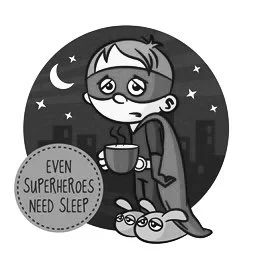Sleep is your superpower
« Sleep is not an optional lifestyle luxury.
Sleep is a nonnegotiable biological necessity. »
INSPIRED BY :
MATTHEW WALKER
sleep scientist
professor
author of :
Why We Sleep
I. SLEEP FOR YOUR BRAIN
a. The brain and the functions of learning and memory
We need sleep before and after learning
- to get our brain ready to soak up new information
- and to hit the save button on our new memories.
Without sleep, the memory circuits of our brain become “waterlogged”,
we are not able to absorb any new information.
A study has been done on all-nighters :
- the deprivation group was kept awake
- the sleep group got a full eight hours of slumber.
Snapshots of brain activity were taken as they tried to learn a whole list of new facts,
and they were tested to see how effective that learning had been.
–> The study showed there was a 40% deficit in the ability of the brain to make new memories without sleep.
To put that in context, it would be the difference in a child acing an exam versus failing it miserably.
What goes wrong within our brains to produce these types of learning disabilities ?
The hippocampus is a structure that sits on the left and the right side of our brain.
It is like an informational inbox : very good at receiving new memory files and at holding on to them.
There is :
- lots of healthy learning-related activity observed in the hippocampus in the people who'd slept a full night
- no significant signal whatsoever in the people who were sleep-deprived.
–> Sleep deprivation shuts down our memory inbox and any new incoming files are just being bounced.
What is it about the physiological quality of our sleep that restores and enhances our memory and learning ability?
There are big powerful brainwaves that happen during the very deepest stages of sleep.
They have riding on top of them sleep spindles, spectacular bursts of electrical activity.
It's the combined quality of these deep-sleep brainwaves that acts like a file-transfer mechanism at night,
shifting memories from a short-term vulnerable reservoir to a more permanent long-term storage site.
b. Aging and dementia
As we get older :
- our learning and memory abilities begin to fade and decline
- our sleep gets worse, our deep quality of sleep in particular
These two things are not simply co-occurring, they are significantly interrelated.
The disruption of deep sleep is contributing to cognitive or memory decline in aging and in Alzheimer's disease, although it is a factor that is often under appreciated.
Many of the other factors that are associated with aging, such as changes in the physical structure of the brain, are fiendishly difficult to treat.
But when it comes to sleep, we may be able to do something it.
There is a method based on direct current brain stimulation,
where a small amount of voltage is inserted into the brain and has a measurable impact.
It consists in amplifying the size of the deep-sleep brainwaves,
and in doing so, doubling the amount of memory benefit that we get from sleep.
There are wonderfully good things that happen when we get enough sleep,
and alarmingly bad things when we don't,
both for our brain and our body.
II. SLEEP FOR YOUR BODY
a. Sleep loss and the reproductive system
Men who sleep five hours a night have significantly smaller testicles than those who sleep seven hours or more.
In addition, they will have a level of testosterone which is that of someone 10 years their senior.
A lack of sleep will age a man by a decade in terms of that critical aspect of wellness,
and it can also cause equivalent impairments in female reproductive health.
b. Sleep loss and the cardiovascular system
A big experiment takes place every year : the daylight saving time.
When we lose one hour of sleep in the spring, there is a subsequent 24% increase in heart attacks.
When we gain an hour of sleep in the autumn, there is a 21% reduction.
The same profile has been observed for car crashes, road traffic accidents, and even suicide rates.
c. Sleep loss and the immune system
Our natural killer cells are almost like the secret service agents of our immune system :
they identify dangerous, unwanted elements (such as cancerous tumor masses) and eliminate them.
What we wish for is a strong set of these immune assassins at all times,
but we don’t have that if we're not sleeping enough.
When our sleep is restricted to 4 hours for one single night, we suffer a 70% reduction in natural killer cell activity.
Such a drop is a concerning state of immune deficiency.
–> Sleep and cancer
This explains the significant links between short sleep duration and our risk for the development of numerous forms of cancer such as cancer of the bowel, cancer of the breast, and cancer of the prostate.
The link is now so strong that the World Health Organisation has classified any form of nighttime shift work as a probable carcinogen because of a disruption of the sleep-wake rhythm.
–> Sleep and the genetic code
A lack of sleep will even erode the very fabric of biological life itself, our DNA genetic code.
Study :
A group of healthy adults got six hours instead of full eight hours of sleep a night for one week.
The change in their gene activity profile was measured.
—> A sizeable and significant 711 genes were distorted in their activity, caused by a lack of sleep :
- about half of those genes were upregulated, increased in their activity : genes associated with the promotion of tumours, long-term chronic inflammation within the body, and cardiovascular disease as a consequence of stress
- the other half were decreased, switched off : genes associated with the immune system
There is simply no aspect of our wellness that can retreat at the sign of sleep deprivation and get away unscathed.
It is like a broken water pipe in our home : sleep loss will leak down into every nook and cranny of our physiology, even tampering with the very DNA nucleic alphabet that spells out our daily health narrative.
It is known from epidemiological studies across millions of individuals, that the old maxim “ you can sleep when you're dead ” is mortally unwise advice.
There's a simple truth: short sleep predicts all-cause mortality.
The shorter your sleep, the shorter your life.
III. HOW TO GET BETTER SLEEP
1. Alcohol and caffeine
Avoid the damaging and harmful impact of alcohol and caffeine on sleep.
2. Naps
Avoid naps during the day if struggling with sleep at night.
3. Regularity
Go to bed and wake up at the same time, whether it's a weekday or the weekend : regularity is key, it will anchor your sleep and improve its quantity and quality.
4. Temperature
Keep it cool, aim for a bedroom temperature of around 18 degrees Celsius : your body needs to drop its core temperature to initiate sleep and to stay asleep.
5. Association
Break the association of your bedroom with the place of wakefulness : if tossing and turning and staying in bed awake for too long, do something else, go to a different room. Only return to bed when sleepy to relearn the association of your bed with the place of sleep.
You'd never sit at the dinner table, waiting to get hungry, so why would you lie in bed, waiting to get sleepy?
IV. SLEEP LOSS EPIDEMIC
Sleep is not an optional lifestyle luxury, it is a nonnegotiable biological necessity.
It is our life-support system, and it is Mother Nature's best effort yet at immortality.
We, human beings, are the only species that deliberately deprive ourselves of sleep.
But we can't catch up on it. It is not like the bank : we can't accumulate a debt and then hope to pay it off at a later point in time.
Nature, throughout the course of evolution, has never had to face the challenge of sleep deprivation. So she's never developed a safety net for it.
That is why our health deteriorates so quickly when we undersleep, and things implode both within our brain and our body.
There is a silent sleep loss epidemic that is fast becoming one of the greatest public health challenges of the 21st century.
The decimation of sleep throughout industrialized nations is having a catastrophic impact on our health, our wellness, even the safety and the education of our children.
It is now time for us to reclaim our right to a full night of sleep, without embarrassment or that unfortunate stigma of laziness.
In doing so, we can be reunited with the most powerful elixir of life.
If we just decide to prioritise.
by : antιdrastιc element
based on : Matthew Walker’s TED talk
photo credιt : ted.com
image credιt : clipart-library.com, shutterstock.com
Thanks for reading!



